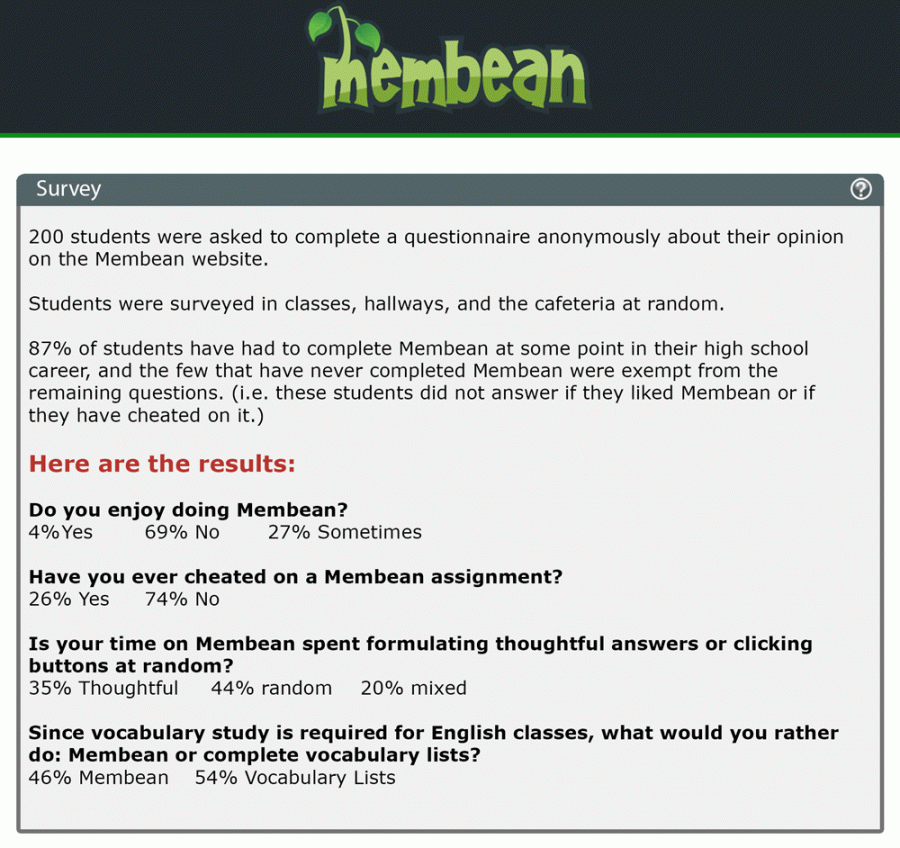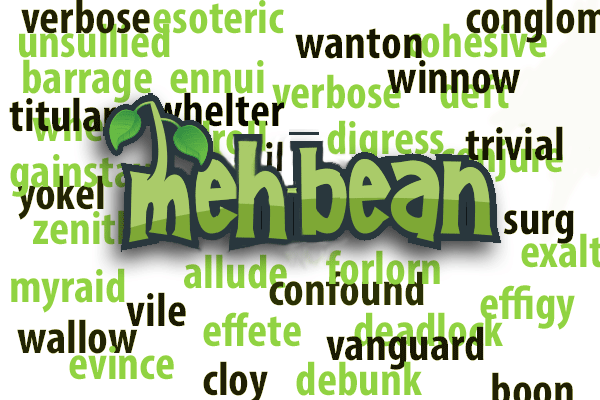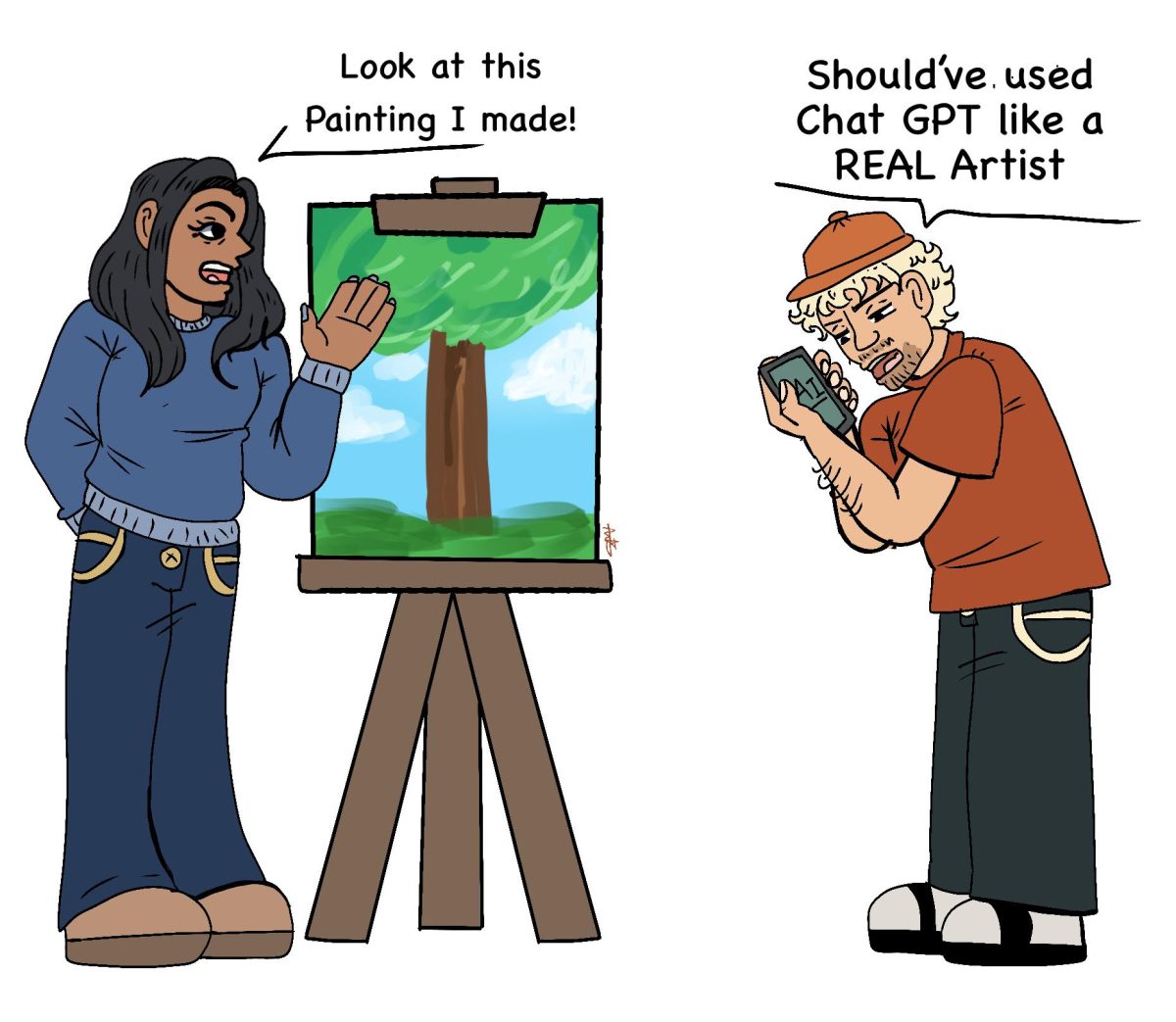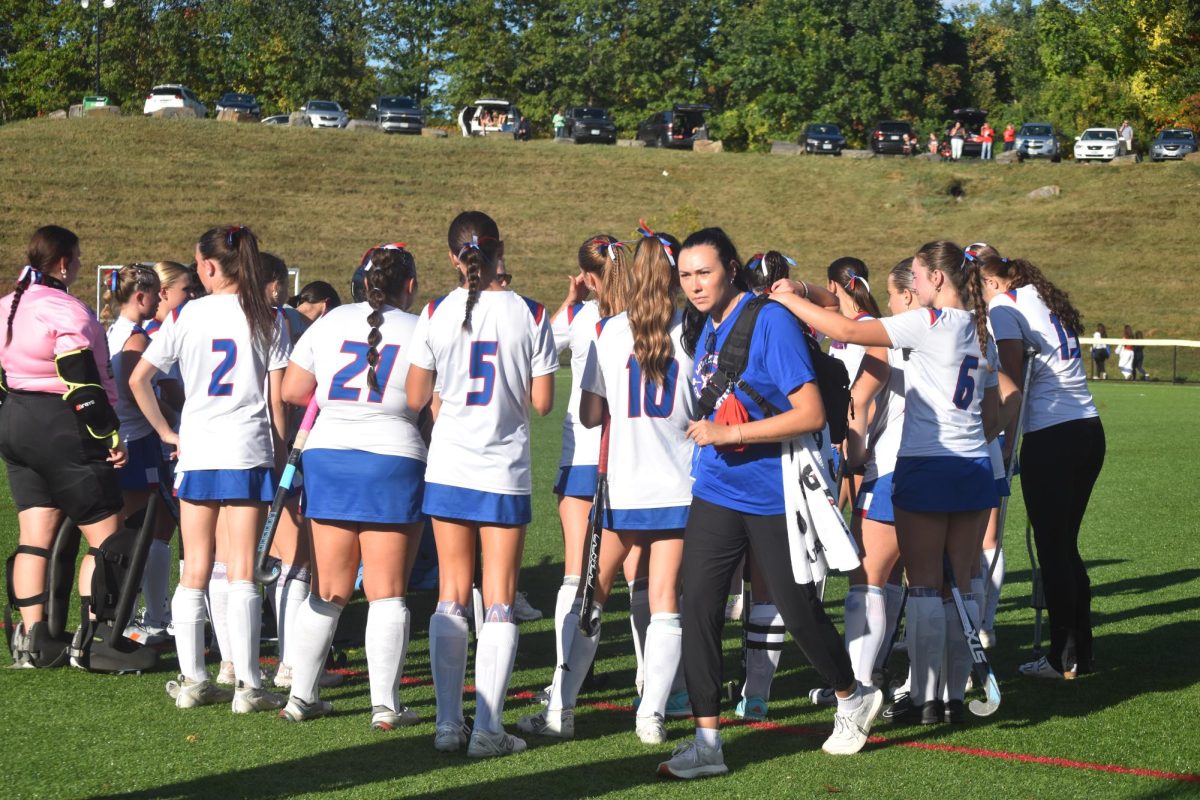Every Sunday night at roughly 11:30, the English students of LHS realize that they haven’t done their weekly Membean.
And panic sets in.
For those of you who do not know about Membean, it is a website where students can log on and complete vocabulary assignments. The teacher can assign how long they want students to spend online and the website logs the total time, allowing for teachers to grade more easily. As a student progresses, the vocabulary gets harder and they can move up levels.
In theory, it sounds like a good idea. Students can study individualized vocabulary which can focus on words they don’t know, and teachers can easily see which students are struggling, assign quizzes and see grades.
The problem comes with getting the students to actually do the work.
There are many ways to avoid Membean and still get the A: Bribe your siblings, beg a friend or simply click on the screen every few minutes while you finish up a science lab.
Some students have even managed to modify the website to ‘auto-click’ the correct answer every few minutes. Other students have turned Membean into a business and receive money from fellow students in exchange for completing the required time.
Then there are the quizzes. Some teachers don’t assign quizzes at all, some let you retake until you get the grade you want, and some assign them just like any other vocab assessment.
When teachers assign a quiz, Membean compiles a multiple choice test based on the student’s vocab. However, each quiz is personalized, so a student on a higher level has a harder test. For example, a student who is on level 4 would have a harder test than someone in level 1. So a student receives a quiz on what they’ve been studying at whatever level they are.
But how is it fair that a student can receive a lower grade on harder vocabulary? There is no incentive for a student to be at a harder level when they could stay at level 1, which has more basic words. In some ways, students are penalized for moving up levels and working harder.
Teachers should reward students who are at higher levels for the extra work they put in because a student who has harder vocabulary, regardless of intelligence, is going to have to work harder to receive a 100 on that quiz. These students should receive extra points for their mastery of more difficult words.
Dr. Lindley-Soucy, the school’s curriculum coordinator, was one of the administrators who chose Membean as the school’s vocabulary website, and explained that it is meant to supplement the curriculum and take the place of traditional vocabulary lists. While she said she knows that students could cheat on Membean or on any assignment, she thinks most students are honest and hardworking.
Mrs. Wooding, who uses the website for her CP 11 students, is another supporter of Membean. Wooding said that students use Membean words on their standardized tests, and that while the program needs to be combined with words from books students are reading, it is more interactive, and students remember it longer. She says that this is opposed to cramming for an end of the week quiz, and forgetting it the week after. According to Wooding, while no method is the “end-all-be-all,” it is more effective than traditional vocabulary lessons.
But I disagree.
The new SAT no longer focuses on vocabulary words, and the ACT doesn’t directly test vocabulary either. Yes, having a good vocabulary is always useful to have when taking these standardized test because of the reading sections, but wouldn’t it make sense then to just increase the amount students read rather than having them do Membean? That would help students with reading comprehension and other skills which they need as well.
In fact, a 2015 study commissioned by the U.S. Board of Education found independent reading does just that.
The study states, “The amount of free reading done outside of school has consistently been found to relate to growth in vocabulary, reading comprehension, verbal fluency, and general information. Students who read independently become better readers, score higher on achievement tests in all subject areas, and have greater content knowledge than those who do not.”
With Membean, students are being asked to focus on only one element: vocabulary. Independent reading, on the other hand, not only helps students with vocabulary but also helps them with a variety of other important skills.
Don’t get me wrong, I do understand why teachers like Membean because it teaches the roots of word and can be a daily vocabulary practice. However, many students don’t use it daily or in small sessions like is recommended, so all the possible benefits won’t matter if students aren’t actually doing it.
I understand that is the student’s responsibility to take charge of his or her own learning, and some kids won’t do anything no matter what the teacher assigns. But there has to be a better way which will reach and educate more students.
If the goal is to have a better vocabulary and better reading skills, then focusing on independent reading and in-context vocab makes more sense because that’s a more authentic experience for students.
Membean, on the other hand is artificial because it only supplies a sentence of context for words, which just isn’t enough to be effective. Learning words in the context of a book gives students an applicable knowledge of a word, instead of having a student guess what a word means from a random picture.
There are millions of novels out there, and hundreds in the school library. Students could consistently find novels that interest or challenge them, and often both.
And while not every book would push the vocabulary of the students with 30 new vocabulary words a chapter, there would be some unfamiliar words. Even novel’s like Stephanie Myer’s Twilight has words like myriad and verbose, which are both level 3 Membean words, a level many students never even get to.
Yes, students will probably read some books that may not be that challenging, but there will still be some words that they do not know. Figuring out what these words mean in context, or looking them up is far more effective than clicking buttons on a screen.
And yes, some teachers do assign independent reading or vocabulary lists or in-context vocab, but many don’t.
New isn’t always better, and traditional vocabulary lists can be effective. Maybe students should be assigned lists with vocabulary words from the stories they are reading, which they have to find as they read. Vocabulary lists based on books could force students to learn difficult words in their reading, instead of just skipping over them. This would also build a student’s ability to understand words in context.
Even better, students could create their own vocabulary lists from their independent reading with the vocabulary word and page number where they found it. They should then have to use the vocabulary word in a sentence as well as explain its meaning. If a teacher feels that a word is too easy, or that the student might not be truthful about its location in a book, they can check to see if it’s where the student says it is. This way students are doing independent reading, developing vocabulary, and developing other skills, such as sentence structure and an understanding of fluency.
And while it could be said that independent reading or reading lists cannot be enforced, Membean can’t be either. Yes, students can cheat on their vocab lists, but they can cheat on Membean as well. However, students would be more likely to complete assignments if they’re dealing with novels and topics they are interested in.
The responsibility for these assignments lay in the students hands, and no matter what teachers do, some students are going to find their way around completing the assignment as expected. But that doesn’t mean teachers should just continue assigning Membean, and check off that they’ve completed their vocab requirement. There is time and space in the curriculum if you replace the time spent on Membean every week with independent reading.
Teachers should get rid of Membean and use that time to get more books into more students’ hands. This will prepare students better for standardized tests, college, and beyond.
It’s time this Membean session timed out.
Membean Survey

As part of the above survey, students were asked to voice
their opinions on Membean. Here are some of their thoughts:
Membean-ing strategy differs from person to person, with some taking the time to formulate thoughtful answers, while others click on buttons at random.
One Honors 11 student said that they spend their Membean time “clicking on the ‘how much time left’ button and crying when I still have 15 minutes left.”
Surroundings can also influence how hard students try. In regards to their strategy, one Honors 12 student, said they do “a little bit of both, during class it was real answers- when I was home I didn’t try.”
Vocabulary lists are a possible alternative to Membean.
“Students should have a choice between the two,” a CP 11 student said.
Many students felt as though Membean didn’t completely serve its purpose.
“It’s really pointless. Random word and definition memorization doesn’t help anyone,” an Honors 12 student said.
“I don’t find Membean useful. It’s the equivalent of opening a dictionary and attempting to memorize a word,” an Honors 11 student said.
“A computer doesn’t replace a teacher,” a CP 10 student said.
“It is a waste of time and 99% of people cheat.”
“I don’t focus on learning, only on getting it done.”
Many students claimed that Membean is “tedious,” “boring,” and “time consuming.” Many students also claimed that they had “more important things to do.”
“It’s easy to cheat on, and I like it for that. But in reality it’s really bad. It’s not enough to actually help anyone,” a CP 12 student said.
“Tedious. In the end, it’s more of a waste of time than a study tool,” a CP 12 student said.
“I feel like it is a waste of my time because I never use it and I feel like it teaches false studying habits,” a CP 9 student said.
“I kind of like Membean because when doing the program, I remember the words. However, I don’t find myself using that vocabulary in class,” a CP 9 student said.
“I like it because we get to use the computers, but I don’t like how tedious the Membean process is,” a CP 9 student said.
“I like learning vocab but I’d rather do it on my own time. 30 minutes is a lot when I have two essays and a project as well,” an Honors 12 student said.
“I am a visual learner so some aspects on the vocab page helped, but it was very tedious,” an Honors 12 student said.

















M
Dec 17, 2021 at 8:13 pm
Wow…privilege is far more blinding than one who is privileged can imagine
Isaac
Feb 7, 2021 at 1:51 pm
Once you’ve done Membean (that word should not be a proper noun) for a while you memorize the questions that go with the words, not the words themselves. It starts to get boring then because you can easily speed through it. While I understand the need for a bigger vocabulary, I honestly think Membean (here we go again) is fundamentally broken. The program would be much better if you had multiple questions for each word instead of one.
TL;DR: Membean is broken because it is easily predictable.
Meynard John Cano
Nov 7, 2020 at 12:53 am
To what extent do you agree with the comments made in the article?
Ricardo Tapia
Nov 3, 2020 at 10:49 pm
I agree with membean being a awful boring chore to do for an assignment i would stall by playing videos and definition. I only did it to get it done and not learn those words , what you said about students having to do independent reading is a better than staring at a screen and clicking buttons at least the students can read or novels that interest them. Hopefully schools can stop using membean i feel like its useless to me but there are people who might say that membean worked for them and i say to that is ” everybody is different ” and depends on the type of student you are, anyways thank you for the article it sparked my mind and was fun to read
Iluvlitten
Sep 10, 2020 at 12:39 pm
As a high school student, i have actually have been greatly helped by membean, i have alway had an extremely hard time with spelling even though i am an avid reader and eventually just gave up on ever improving, cue membean, it single handedly has improved my spelling efficiently and rapidly whilst keeping me engaged. Since it offers many different ways to learn a word nobody gets left behind from a certain teaching style. on top of all that it encourages shorter study sessions rather than doing it all at once, a good practice if you actually want to learn something. In conclusion membean should be continued to be used even if its only for people struggling.
Reiland Eubank
Feb 21, 2019 at 8:42 pm
if you want to know how bad, boring, and tedious membean is, look at the fact that I’m writing this right now. I’m in the middle of my 60th minute of membean that I’ve done today in order to reach my 90 minute minimum that is due in a few hours. I am so bored doing membean, i’m quite literally reading an article about membean, and now as you can see, I’m writing a rather long response in between glancing at my sentences and choosing words.
Kira Ruble
Jan 18, 2019 at 2:08 am
As a 10th grader in my first year of high school, this is my first year of using Membean. The majority of all of the classes (of all grades) who use Membean find it absolutely worthless. When asking around to get people’s opinions on Membean, I thought that it would be a pretty even split. I completely agree with the case of just wanting to finish it and not learn from it. In my class we have to do an hour every week over at least 2, 30 minute periods. Membean is due on Thursday at 11:59 and most kids do their 30 minutes Wednesday and Thursday and surprisingly a substantial amount of students do one hour on Thursday and think that the loss of points is worth only having to do Membean once a week. I did like Membean when it was first incorporated into our educations but now it is just another mind numbing English assignment. Doing an hour of Membean doesn’t sound that bad but on top of countless essays and Shakespeare evaluations it seems to add another layer of stress onto kids lives.
In no way am I trying to brag when I say this but I have generally have had better English scores than most kids in my grades. I am by no means an expert but I do often find myself seeing errors in other teacher’s works and some of my older siblings college essays and such. This means that I have a high level in Membean and it is so uninspiring to take a harder test and not get more credit for my scores versus the other kids on levels 1, 2 or 3. I already have a hard enough class load with my other classes so Membean is often an afterthought or in a scenario of “if i have time to get all 30 minutes I need for today.” Membean seems unnecessary and is tearing apart high school student’s morale which are already incredibly low.
Domenico Perrella
Nov 8, 2018 at 9:24 pm
I’ve been perplexed by Membean “scores” from the start. I was told that it’s supposed to adjust difficulty based on the student’s ability, like computer adaptive testing, but it is scored based on how many questions a student gets right. That doesn’t make sense. If the difficulty is variable, scores and grades should depend on progress (the level of difficulty reached) not scores (the percentage each student gets right regardless of the difficulty of the material they’re working on).
Apparently, the system is supposed to increase the number of new words introduced and the difficulty of the new words as a student progresses. So, if it works, a slower learner with a smaller vocabulary will get easier assignments and easier “assessments” (tests) than a faster learner with a larger vocabulary. That’s great. Each kid can learn a their own pace.
But, if it works perfectly, all of the children will – on average – get about the same score (percentage correct). The materials given to the more advanced students will get harder until they’re getting more wrong and the materials given to the less advanced students will get easier until they’re getting more right. There is probably a threshold that, if you get more than x% right, the material gets harder and if you get less than x% right it gets easier. Eventually, most students should get about x% right on each assessment, regardless of the size of their vocabulary or how much progress they’ve made.
Again, it’s probably a good thing that all the kids get about the same percentage right on each test/assessment. Nobody has to be demoralized and nobody needs to get cocky. But the scores that students receive should be similar, regardless of the students’ abilities, with any differences being essentially random. Using that to grade students is frankly moronic. Sophisticated testing companies use tests that adjust in difficulty depending on the test-taker’s ability. Some sort of adaptive testing is used in the GRE and GMAT and it’s probably coming to the SAT and ACT. I think that’s kind of the state of the art in educational testing. But these tests don’t give students a score based on the percentage they get right with some students taking much harder tests than others. The scoring is based on the level of difficulty you reach while getting about the desired percentage of questions right. That explanation may be a bit less accurate with the current version of the GRE, but it’s in the ballpark.
If I’ve never been trained as an educator and this is obvious to me, it troubles me a bit that my school district doesn’t get this and it worries the hell out of me that the developers of Membean either don’t understand it or just care so little that they don’t bother to explain it to teachers or to give them scores that actually tell teachers something about a student’s abilities and effort.
This is a surprisingly large percentage of my daughter’s grades in language arts and the scores are meaningless. I may be discussing this with her school’s administration.
Ratherbe Anonymous
Oct 15, 2018 at 5:45 pm
The single biggest problem I see with membean is its inability to reward actual progression. The more you learn, the harder the quiz gets. There is only incentive to not learn, so that the quizzes can be easier.
A. Barnes
May 6, 2018 at 2:52 pm
This has been my third year using Membean. One of the frustrations is that many students don’t complete the assignments out of class. I dropped that requirement and used Membean as a “warmup” requirement during the first 10 minutes of class, three times a week. I enforced it by seeing, in real time, who was on or not and reminded them to sign in. I asked the company about ways to make the quizzes harder. They already had something in place to make the quizzes more difficult (for everyone–no matter what level), and this encouraged some students to put in more time at home. Because of the harder questions (the multi-correct sentence questions), the percentage of 100% grades dropped and students asked for retakes. They didn’t get the retake unless they logged more practice minutes outside of class.
My students are 10th graders. My students who have moved on to upper grades and to college report that although they disliked Membean at the time, they still remember the words and use them in their writing.
j.super
Jan 11, 2018 at 1:06 pm
This is the single greatest thing regarding membean I have ever seen.
Sally Hawkins
Oct 19, 2016 at 1:38 am
Great article! Membean is the shiny new penny that costs thousands to implement. And the students quickly grow to dislike it once the novelty wears off. There’s no substitute for good teaching even though some teachers are always looking for the latest greatest shortcut. Teaching is hard work!
Jake Barbieri
Apr 12, 2016 at 10:21 am
Hello MK Nix,
Thanks for the response! The font used in the graphic is Kartika.
MK Nix
Apr 11, 2016 at 9:56 pm
Hi Liz! I was wondering if you could send me the name of the font you used for the graphic of this article? Great story!
Thanks,
MK
[email protected]
Barbara Mee
Feb 18, 2016 at 7:04 pm
I had no idea about this, but Liz Stubbs…you wrote an amazingly powerful, persuasive piece.
Congrats! #